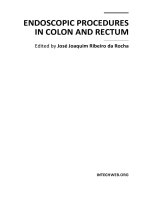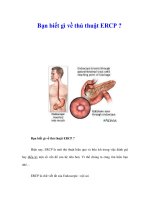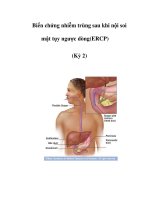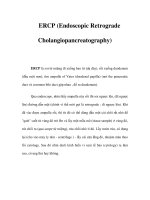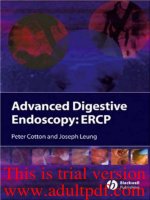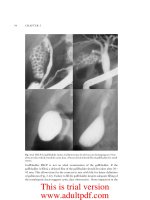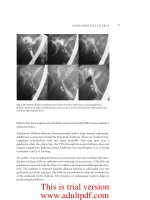ENDOSCOPIC RETROGRADE CHOLANGIOPANCREATOGRAPHY (ERCP)
Bạn đang xem bản rút gọn của tài liệu. Xem và tải ngay bản đầy đủ của tài liệu tại đây (203.28 KB, 25 trang )
ENDOSCOPIC RETROGRADE
CHOLANGIOPANCREATOGRAPHY
(ERCP)
Gastroenterology Department
INTRODUCTION
CASE STUDY
Girl, 7 years old
Chief complaint: acute upper abdominal
pain
History:
1 weeks: epigastric pain, vomitting
vomitting,, not fever
Physical examination
Epigastric tender, discomfort.
No jaundice
LABORATORY TESTS
Bili T/ Bili D: 9/ 5 ( mg/ L)
AST/ ALT: 98/ 53 ( UL)
Amylase: 667 ( UL)
Lipase: 646 ( UL)
Diagnostic Image
Abdominal ultrasound:
Dilatation of common bile duct (D# 12 mm)
Dilatation of duct of Wirsung (d# 6mm) with
small stone
Impacted stone at the ampulla, d# 14x 9mm
No ascites
CT scan
Contour show irregularity, heterogeneous
enhancement, calcification
Enlargement of the pancreas with small stone
d# 5mm
Ampullary edema spread to D2 of duodenum
Discussion
How’s about the technical outcomes and
complications of ERCP in children?
What is indication for ERCP in children?
Recommendations for ERCP in acute
pancreatitis?
Potential role of ERCP at Children’s
Hospital No2?
Technical outcomes and complications of ERCP in children
Varadarajulu S1, Wilcox CM,
CM, Hawes RH,
RH, Cotton PB
The aim of this study was to compare the
success and complications of diagnostic
and therapeutic ERCP in children (age
<18 years) and adult patients.
METHODS
A retrospective casecase-controlled study was
conducted in which all children undergoing
ERCP at two centers (1994(1994-2002)
RESULTS
A total of 116 children (mean age 9.3
years, range 1 month to 17 years;
median age 8.1 years) and 116
matched adult patients (mean age
56.3 years, range 2020-83 years; median
age 49.7 years) underwent 163 and
173 ERCP procedures, respectively.
RESULTS
According to procedure complexity
grade, each group included the same
number of patients, grade I, 72
patients; grade II, 12 patients; and
grade III, 32 patients.
RESULTS
Procedure success rate was 97.5% in
children vs. 98% in the adult cohort (p= not
significant).
The complication rate was not significantly
different between children and adult
patients (3.4% vs. 2.5%).
CONCLUSIONS
When ERCP is performed in children by
expert endoscopists
endoscopists,, the success rate is
high and the complication rate is low, both
being comparable with those for ERCP in
adult patients.
Biliary disorders evaluated by ERCP
©2013 UpToDate ®
Congenital:
Biliary atresia
Alagille syndrome*
Caroli disease*
Biliary cysts
Biliary strictures
Bile plug syndrome
Malignant biliary strictures
Common bile duct complications after liver
transplantation
Biliary disorders evaluated by ERCP
Acquired:
Sclerosing cholangitis
Ascariasis choledocholithiasis
Bile plug syndrome
Malignant biliary strictures
Common bile duct complications after liver
transplantation
ERCP for pancreatic disorders in
children
©2013 UpToDate ®
Pancreatitis
Nonresolving acute
Idiopathic recurrent
Chronic persistently elevated pancreatic enzymes
Evaluation of abnormalities on ultrasound, CT or MRCP
Pancreatic pseudocysts
Pancreatic trauma Pancreatic ascites Pancreatic duct leaks
Pancreatic duct obstruction (eg
(eg,, stone or stricture)
THERAPEUTIC PROCEDURES
1.
2.
3.
4.
5.
6.
7.
Endoscopic nasal drainage
Biliary sphincterotomy
Pancreatic sphincterotomy
Stone extraction
Stent insertion
Balloon dilatation
Endoscopic drainage of pseudocyst
CONTRAINDICATION
1.
2.
3.
4.
5.
6.
Perforation of a hollow viscus
Shock, cardiopulmonopathy
Cervical spine injury
Intestinal obstruction
Pancreatistis,cholangitis
Esophageal stricture,postoperative changes in
anatomy, large paraesophageal hernia
Endoscopy for the treatment of
acute gallstone pancreatitis
Tse F, Yuan Y, 16 May 2012
This review compared the effect of the two
treatment strategies in patients with acute
gallstone pancreatitis.
Seven studies, with a total of 757 patients,
were reviewed and provide the best
available evidence
The early ERCP strategy does not reduce
death or complications compared to the
early conservative management strategy
in patients with acute gallstone
pancreatitis, regardless of the severity of
the attack.
However, early ERCP may be beneficial in
patients who have infection of the bile duct
or bile duct blockage.
RECOMMENDATIONS for ERCP in
acute pancreatitis
Patients with acute pancreatitis and
concurrent acute cholangitis should
undergo ERCP within 24 h of admission
(strong recommendation, moderate quality
of evidence).
ERCP is not needed in most patients with
gallstone pancreatitis who lack laboratory
or clinical evidence of ongoing biliary
obstruction (strong recommendation, low
quality of evidence).
RECOMMENDATIONS for ERCP in
acute pancreatitis
In patients with gallstone pancreatitis, we
early ERCP and sphincterotomy for those
who have a high suspicion of cholestasis
and those with cholangitis ( Grade 1B ).
Cholecystectomy should be performed
after recovery in all patients with gallstone
pancreatitis.
PROSPECT AT CHILDREN’S
HOSPITAL No2
January 20102010-January 2014
Diagnostic
Patients
Acute pancreatitis
Recurent acute pancreatitis
125
14
Chronic Pancreatitis
7
Pancreatic pseudocysts
34
Choledocholithiasis
55
Total
235
REFERENCES
1.
2.
3.
4.
5.
6.
Scott Tenner MD, M., FACG1, John Baillie MB, ChB
ChB,, FRCP,
FACG2, John DeWitt MD, FACG3 and Santhi Swaroop Vege MD,
FACG4, Management of Acute Pancreatitis ,American
,American Journal of
Gastroenterology., 2013.
Varadarajulu S1, W.C., Hawes RH, Cotton PB. Technical outcomes
and complications of ERCP in children,2005
children,2005 PubMed.
PubMed.
Tse F, Y.Y. Endoscopy for the treatment of acute gallstone
pancreatitis. 2012 [cited; Available from: Cochrane Reviews.
Otto AK1, N.M., Slivka AN, Kane TD. An appraisal of endoscopic
retrograde cholangiopancreatography (ERCP) for
pancreaticobiliary disease in children: our institutional experience in
231 cases,2011
cases,2011 Pubmed
Pubmed..
Moises Guelrud
Guelrud,, M. ERCP for pancreatic disease in children, 2013
[cited; Available from: www.UpToDate.
Moises Guelrud
Guelrud,, M. ERCP for biliary disease in children 2013 May
30 2013 [cited; Available from: www.Uptodate.
Thank you!
